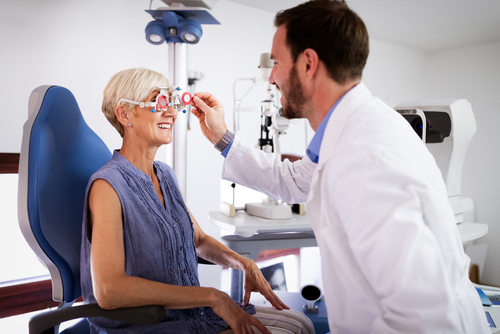Ophthalmology at Summit Health diagnoses and treats diseases of the eye in people of all ages.
During an eye examination, your ophthalmologist will check for ophthalmology diseases such as glaucoma (increased pressure in the eye that leads to vision loss), macular degeneration (deterioration of the retina), and cataracts (clouding of the lens).
Eye Exam Guidelines
The American Academy of Ophthalmology notes that, by age 65, one in three Americans will have a vision-impairing eye disease. Signs of these diseases can begin in midlife, but people often have no symptoms. The earlier these diseases are found and treated, the better the chances of preserving good vision.
An eye exam involves a series of tests to evaluate your vision and check for eye diseases. Unless a problem is identified and more frequent visits are advised, below is a quick breakdown of recommendations for frequency of eye exams by age group:
|
Age |
Eye Exam Frequency |
|
6 months to 20 years |
Pediatricians should screen children regularly at wellness appointments and refer them to ophthalmology for any abnormalities. |
|
In your 20’s |
One visit |
|
In your 30’s |
One visit every five years |
|
At age 40 |
One visit (comprehensive exam) |
|
Between 40 and 65 |
One visit every two years |
|
Age 65 and older |
One visit annually |
While the above guidelines are for those who have “excellent vision”, the frequency of ophthalmology examinations should also be determined by personal health and family history. Individuals with certain risk factors like diabetes or hypertension should have annual eye exams regardless of age.
Our Eye Care Specialists
Our eye care specialists are uniquely qualified to treat many common and uncommon eye conditions and diseases.
Ophthalmologist or Optometrist: Who Should I See?
Though both ophthalmologist and optometrists are eye care specialists who play an important role in the eye health of patients, there are differences between the two.
An ophthalmologist is a medical doctor who specializes in eye and vision care. He or she has completed college, eight or more years of additional medical training, including medical school and residency, and is licensed to practice medicine and surgery. An ophthalmologist can diagnose and treat all eye diseases, perform eye surgery, and prescribe eyeglasses and contact lenses.
Some ophthalmologists have more in-depth training (fellowship) in a specific area, which allows them to care for more complex conditions of the eye.
Optometrists hold a Doctor of Optometry (OD) degree after completing at least three years of college followed by four years of optometry school. As eye care professionals, they are licensed to perform eye exams and vision tests, prescribe corrective lenses, and diagnose, treat, and manage certain eye conditions and diseases as well as vision changes.
Common Conditions Treated
Procedures Performed

